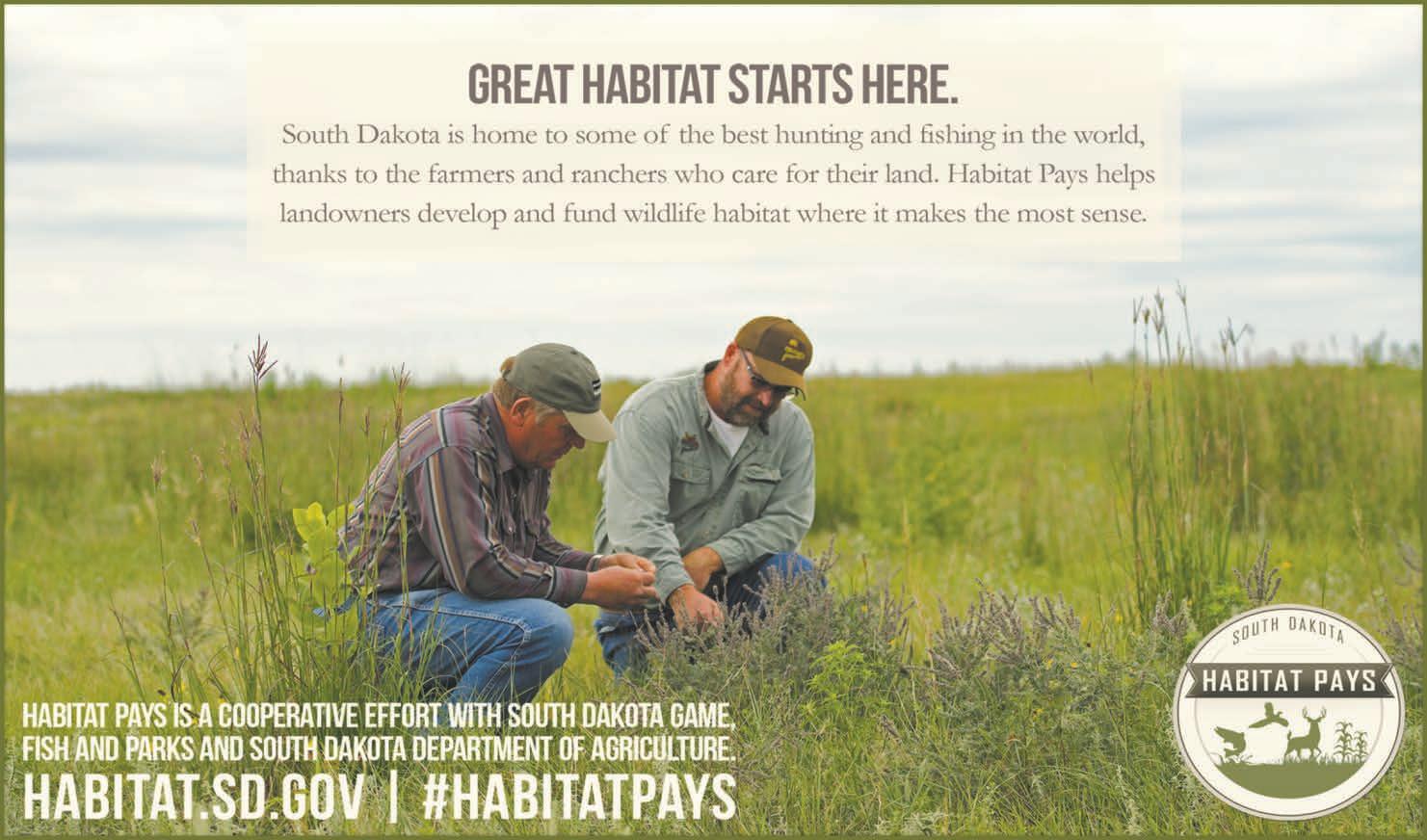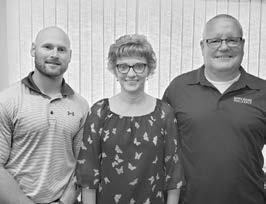
6 minute read
Resiliency in the face of extreme weather, major stress
Soil health producer says his way of management helps him in difficult times
By Janelle Atyeo
S outh D ak ota S oil H ealth C oalition
The record wet year in 2019 left many acres in South Dakota unsuitable for planting, but on Doug Sieck’s cropland near Selby, South Dakota, he was able to plant every acre he wanted to. He attributes that to decades of no till management and the years of cover cropping that have helped build healthy soil. He’s found his land is more resilient when it comes to handling weather extremes — whether drought or heavy rain.
“That resiliency helps to reduce my stress level,” he said. Sure, he worries about the things other farm ers worry about — the big one being market prices — but when it comes to whether he’ll get his crop plant ed or harvested, he has faith in the way he’s managed his land. After about 20 years of no till, cover crop ping and incorporating cattle on the landscape, his soil has structure that holds up in wet and dry conditions. The cattle return nutrients for the crop, but they also offer options when nature throws a curveball.
If he’s unable to plant a field until late in the season, he can plant cover crops that can be hayed or grazed. The cattle also take care of high-moisture corn or damaged stands unfit for harvest. “I can be flexible,” he said. “You don’t feel near as trapped. You don’t feel near as stressed.” A recent survey by the South Dakota Soil Health Coalition showed that farmers who used soil health practices were less stressed, more satisfied and had higher optimism than those who used conventional methods. To read the full survey report or view result highlights visit https://sdsoilhealthcoalition.org/farmer-rancher-stress-survey-results/.
While he has ways of keeping a positive outlook, Sieck, a Soil Health Coalition board member, encourages producers to keep in mind that others may be struggling. “It would be a good year to keep an eye on your neighbor,” Sieck said. Uncertainties surrounding the COVID-19 pandemic have added extra stress to agricultural markets, as well as to our everyday lives. With community activities canceled and families practicing social distancing, Sieck said it can help to share what you’re going through and how COVID has disrupted your life.
“It is something that has humbled all of us,” Dr. Michael Rosmann said in a May 12 webinar for the AgriSafe Network. Rosmann, who lives near Harlan, Iowa, is a psychologist and farmer whose life’s work has focused on behavioral health in the agricultural community. While there are many uncertainties around the pandemic that we can’t control, he said, how we deal with COVID is within our control. He encourages farmers to plan with their families and employees on how to handle becoming ill with the disease and to how to deal with its effects, such as unpredictable marketplaces, prices, and COVID-era regulations.
Having a plan can give peace of mind to farmers, families and employees. Taking care of yourself is also important.
“Look at managing your behavior like a feed ration for your livestock,” Rosmann said. Like livestock need optimal amounts of nutrients, proteins and minerals, we need a mix of the right ingredients like physical activity, prayer or meditation and social interaction. He encourages eating well, time for recreation, and making an effort to get enough sleep — especially during busy times like planting season when farmers are working long hours.
Getting enough sleep is a matter of safety. Accumulation of sleep debt produces similar cognitive conditions to drinking too much alcohol, Rosmann pointed out. Reaction time is slower, judgment diminishes, we take more risks, and we have less control over anger. Rosmann also urges farmers to have a support network.
RESILIENCY: Page 15
RESILIENCY
From Page 1 4
Depending on the type of farm, a support team of agronomists, veterinarians, university extension specialists, farm business manage ment consultants, healthcare providers and ministers can all help provide necessary expertise in times of stress.
“Now is the time to be reaching out and to squelch our desire to not share what’s going on internally,” he said. “Just know that we’re not in this alone. We’re all in it together. Through sharing, meditation, rec ognition of a higher force than us, we’re more likely to get through this and come out as better people with more understanding of COVID and survival.”
Despite the pandemic and its impact on markets. Many South Dakota farmers are coming into the season with a better outlook than a year ago. Planting conditions were much improved through much of the state, and that helps take some stress away. “The nice thing about the spring and farming is there’s a sense of hope again — a sense of a new season,” said Scott Stahl, who farms with his dad and uncle near Emery, South Dakota while serving as vice president of the South Dakota Corn Growers Association.
The Stahls weren’t able to plant anything until June 6 last year, and then only 40 percent of their acres were planted. The unplanted fields were seeded with cover crops to keep the soil active and healthy and to grow hay and forage for their cattle. “We really just tried to make the best out of a bad situation,” he said. “Here we are in 2020 doing the same sort of thing in a different way.”
He reminds those who are feeling stressed that there’s nothing wrong with asking for help. With COVID19 causing schools to close, Stahl and his wife, Amanda, took on extra responsibilities at home implementing e-learning for their older children, ages 9 and 7, while caring for a 4-year-old and 9-month-old twins. Stahl also worried about his parents staying healthy, especially his mom, a two-time cancer survivor. They try to take extra precautions on the farm and wash hands. While he works with his dad, COVID has put a temporary end to family gatherings with Stahl’s sisters and their families in Brookings and Sioux Falls. While it

added to the stress, Stahl said he feels blessed to have a healthy family and to spend more time with his kids. “I think times like these really let you know what’s important,” he said.
Still, Stahl knows how hard it can be on farmers when nothing seems to go right. He feels for those in northern South Dakota who are facing another year of prevent plant. It’s hard on farmers when they don’t get to grow a crop. “I really feel like part of your identity gets taken away,” he said.
“It just wears on a person.” That identity is important to Stahl, as someone who can trace his farming ancestry back to Europe. But he finds strength when reflecting on past generations who had their own struggles in times without the luxury of modern equipment and programs like crop insurance. Those that came before him worked through hard times and made tough decisions that ultimately gave him the opportunity to farm today. “That’s sustainable to me,” he said.
Hoffmann Insurance Agency
IN NEED OF INSURANCE? WE CAN HELP! Farm · Home · Auto · Recreation Vehicle · Life · Health







